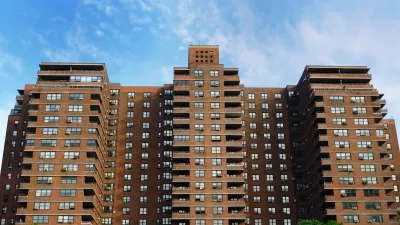Using funds made available by savings captured through administrative reforms and other sources, New York's beleaguered Housing Authority has made considerable progress in tackling one of its most pressing problems - its backlog of maintenance jobs.
Matt Chaban reports on the welcome good news reported this week by an agency that's been beset by administrative and financial problems. "The New York City Housing Authority said Monday it is ahead of schedule on meeting its seemingly impossible pledge to eliminate a staggering backlog of more than 423,000 maintenance jobs—some as old as four years—by the end of the year. NYCHA Chairman John Rhea, along with Mayor Michael Bloomberg, had made the promise early this year. In the first two months, NYCHA maintenance and repair crews have cut the backlog by some 73,000 jobs."
"We think this progress report demonstrates we are on track to deliver on the mayor's promise last year to eliminate this backlog by the time the administration leaves office," Mr. Rhea said at a press briefing this morning. "That said, we still have a long way to go given that we are only two months into this work."
The outlook for completing the work is getting increasingly cloudier, however, notes Chaban. "One big factor that could delay this work is the federal sequester and ongoing fights over the budget on Capital Hill. Already, NYCHA is poised to lose between $60 million and $70 million from the federal Department of Housing and Urban Development because of sequestration. That figure could ultimately be two to three times higher, taking a major bite out of the agency's $950 million annual budget—almost all of which comes from Washington—because of Congress' inability to pass a new budget."
FULL STORY: NYCHA's huge fix-up ahead of schedule

Alabama: Trump Terminates Settlements for Black Communities Harmed By Raw Sewage
Trump deemed the landmark civil rights agreement “illegal DEI and environmental justice policy.”

Planetizen Federal Action Tracker
A weekly monitor of how Trump’s orders and actions are impacting planners and planning in America.

Why Should We Subsidize Public Transportation?
Many public transit agencies face financial stress due to rising costs, declining fare revenue, and declining subsidies. Transit advocates must provide a strong business case for increasing public transit funding.

Understanding Road Diets
An explainer from Momentum highlights the advantages of reducing vehicle lanes in favor of more bike, transit, and pedestrian infrastructure.

New California Law Regulates Warehouse Pollution
A new law tightens building and emissions regulations for large distribution warehouses to mitigate air pollution and traffic in surrounding communities.

Phoenix Announces Opening Date for Light Rail Extension
The South Central extension will connect South Phoenix to downtown and other major hubs starting on June 7.
Urban Design for Planners 1: Software Tools
This six-course series explores essential urban design concepts using open source software and equips planners with the tools they need to participate fully in the urban design process.
Planning for Universal Design
Learn the tools for implementing Universal Design in planning regulations.
Caltrans
Smith Gee Studio
Institute for Housing and Urban Development Studies (IHS)
City of Grandview
Harvard GSD Executive Education
Toledo-Lucas County Plan Commissions
Salt Lake City
NYU Wagner Graduate School of Public Service




























